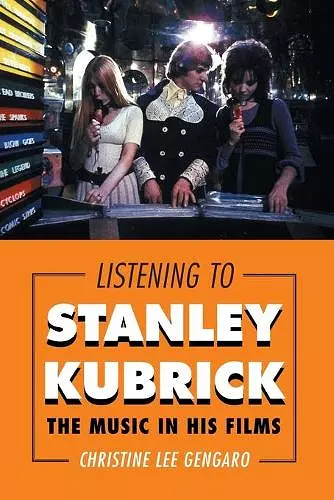Listening to Stanley Kubrick
The Music in His Films
Format:Paperback
Publisher:Bloomsbury Publishing PLC
Published:26th Sep '14
Currently unavailable, and unfortunately no date known when it will be back

The musical scores of Stanley Kubrick’s films are often praised as being innovative and forward-looking. Despite playing such an important part in his productions, however, the ways in which Kubrick used music to great effect is still somewhat mysterious to many viewers. Although some viewers may know a little about the music in 2001 or A Clockwork Orange, few are aware of the particulars behind the music in Kubrick's other films.
In Listening to Stanley Kubrick: The Music in His Films, Christine Lee Gengaro provides an in-depth exploration of the music that was composed for Kubrick’s films and places the pre-existent music he utilized into historical context. Gengaro discusses the music in every single work, from Kubrick’s first films, including the documentary shorts The Flying Padre and Day of the Fight,through all of his feature films, from Fear and Desire to Eyes Wide Shut. No film is left out; no cue is ignored.
Besides closely examining the scores composed by Gerald Fried for Kubrick’s early works, Gengaro pays particular attention to five of the director’s most provocative and acclaimed films—2001: A Space Odyssey, A Clockwork Orange, Barry Lyndon, The Shining, and Eyes Wide Shut. For each film, she engages the reader by explaining how the music was excerpted (and changed, in some cases), and how the historical facts about a musical piece add layers of meaning—sometimes unintended—to the films.
Meant for film lovers, music lovers, and scholars, Listening to Stanley Kubrick is a thoroughly researched examination into the musical elements of one of cinema’s most brilliant artists. Appropriate for a cinema studies or music classroom, this volume will also appeal to any fan of Kubrick’s films.
This is a fascinating look at the films of Kubrick as well as the importance that music plays in setting a scene in a film. It is appropriate for larger universities with extensive film studies collections. * American Reference Books Annual *
In a study that focuses on Kubrick's use of music in both his full-length features and his documentaries, Gengaro (Los Angeles City College) succeeds in her aim to reach readers both with and without musical background. As is well-known from the literature on Kubrick, especially Paul Merkley's article "'Stanley Hates This but I Like It!': North vs. Kubrick on the Music for 2001: A Space Odyssey" (published in the fall 2007 issue of The Journal of Film Music), there are behind-the-scenes twists and turns with the director's decision making vis-à-vis music: for example, his opting to use a temp score rather than composer Alex North's original music. This aspect, sometimes believed to be simply Kubrick's own sense of directorial authority, makes the history of the music difficult to track down. Gengaro offers analyses that will satisfy those who know the film music and at the same time enable those new to the study of film music to find a place to begin their explorations. An engaging read, this book is the most comprehensive study of its kind in English. Summing Up: Essential. All readers. * Choice Reviews *
Christine Gengaro’s book is a comprehensive overview and analysis of American film director Stanley Kubrick’s musical practices. A notable extension of her dissertation research on Kubrick’s A Clockwork Orange, it fills an important gap in the bibliography of film studies, Kubrick studies, and film score studies, locating important sources for research on Kubrick’s soundtracks and highlighting some of the major scholarly arguments and concerns surrounding his work. This book is a compendium, pulling together diverse materials on the director’s approach to film scoring: Kubrick biographies, commentaries on his craft, articles on the effects of his musical choices, and analyses of the scores themselves, including composition and reception histories for the many pre-existing pieces he used. In short, Listening to Stanley Kubrick should be any scholar’s first stop when embarking upon a study of the auteur’s musical choices. . . .Gengaro also shares many of her own observations, based on a wide breadth of research, while making reference to and synthesizing the work of other scholars in the field. What makes her book especially valuable, then, is its usefulness as an introduction to lines of scholarly inquiry that are essential to understanding not only Kubrick’s approach to scoring his films, but also trends in the academic study of Kubrick more generally. Listening to Stanley Kubrick is a biography, a bibliography, and a preliminary analysis of Kubrick and his musical choices, and is an important first stop for anyone—scholar, enthusiast, or both—looking to pursue a deeper understanding of Stanley Kubrick’s influential body of films. * Notes: Quarterly Journal of the Music Library Association *
Listening to Stanley Kubrick is intended foremost to be a useful resource for anyone interested in the music in Kubrick’s films. It achieves this goal and much more. Readers who are unfamiliar with any of the films will find it an excellent starting place. * Journal of the Society for American Music *
ISBN: 9781442244405
Dimensions: 224mm x 156mm x 23mm
Weight: 467g
316 pages